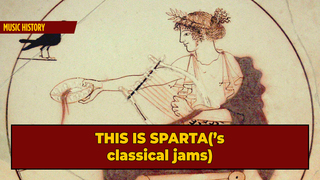We've Learned How Ancient Greek Music Sounded (And It Goes Hard)

As anyone who's had to sit through a 32-minute hymn knows that ancient music can be a real snoozefest. And if it isn't some children's choir asking the gods not to kill us in our sleep, it's some low effort flute-music that sounds like you bought it on CD out of someone's trunk. But that's because you've never heard hardcore Ancient Greek music, which we now know can sound like this:
That uptempo shredding is a song from Orestes by Euripides, a play dating back to 408BC. It is used as proof that ancient Greek music, not the Gregorian stuff, is the basis of Western classical music. But obviously, it can do one better than just classical. Accompanied by an aulos, a two-reed flute, and an obvious precursor to the double-neck guitar, this badass song sounds like something Iron Maiden could've made if they had been around before electricity. Even the lyrics are downright metal:
Oh demon runners, with beating wings
Don't Miss
Goddesses of the night!
With baneful music, you dance sinister revels
With wailing and laments
Ye black-coated kindly goddesses
who tread the thinning air aloft for bloody kin-murder!
demanding due redress, demanding due justice
I beg you from my heart, I beg you from my soul!
That Agamemnon's son is given leave to overcome his frenzies,
these mad attacks driving him wild.
WOE THE TOILS
Or, if you want a more mellow example, how about this string tune from the age of Plato:
Which sounds surprisingly similar to the opening riff of that rock classic, "California Dreamin'" by The Mamas and the Papas:
Sadly, for about 2000 years, nobody had been able to hear how hard ancient Greek music slaps. Why? Until the early 2010s, musical historians had given up on trying to figure out how this lost art was supposed to be played as little to no sheet music was ever found, let alone something that conveyed tone or melody. But after decades of research, scholars like Armand D'Angour, a professor in Classics at Oxford University, claim to have figured out the surprisingly universal sounds of ancient Greek music. And the key lay in realizing just how much the Greeks were music hipsters.
If you think any modern music groups have hardcore fanbases, they're dilettantes compared to the ancient Greeks -- who went all-in on their music in every aspect of their lives. From musical funeral rites to lyre soundtracks for their written epics (this is where the term "lyric" comes from) to even the idea that science is inherently musical in nature, the Greeks were obsessed with the creative splendor of song. Many scholars even believed that they had such a refined meter (beats) in their language that it sounded as if they were sing-speaking like Disney characters gearing up for that big song and dance number.
Imagining how the Greeks were as obsessed with incorporating their music into every occasion like one of those dudes who brings his guitar to every party, D'Angour approached the deciphering of their music sideways. For example, since Greek poetry was also always accompanied by tunes, its meters could be used to determine the music's rhythm. As for the actual melody, D'Angour discovered a likely pattern of "word-paintings," where the musical inflection is determined by the meaning of the words (you go low with words like "fall" or "lament," high with words like "leap") which also makes sense in such a melodic language.
With that theory and the fact that more and more intact instruments are being uncovered, there's a good chance we'll soon be able to listen to the entire remaining back catalog of the Grecian music scene of 2000 years ago. And even if the music isn't identical to how it really sounded back then, if it sounds this good, I'm sure the Greeks wouldn't have minded.
For more melodic tangents, do follow Cedric on Twitter.
Top Image: Fingalo